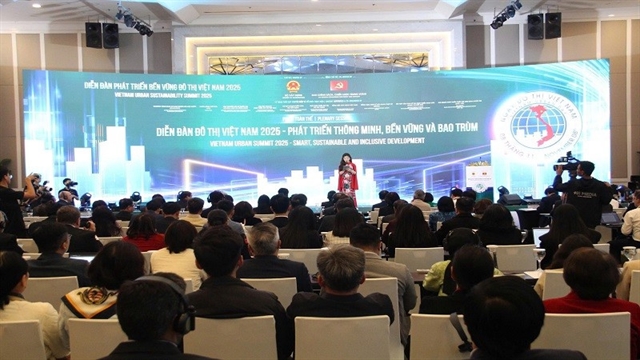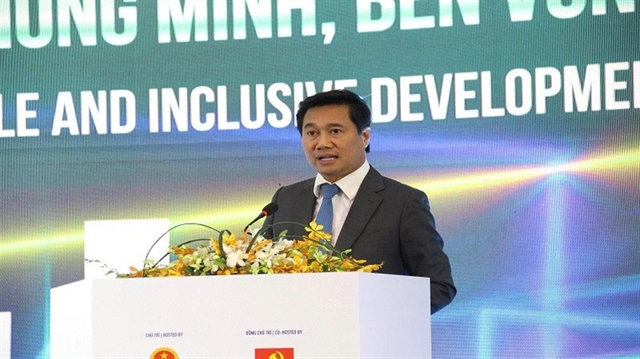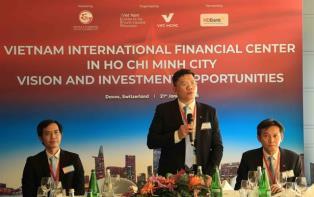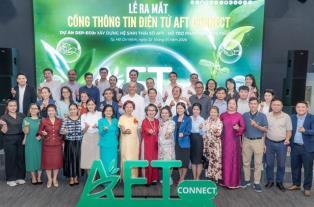Việt Nam identifies urban development as one of three national strategic priorities, but to be successful, it need close coordination in multiple sectors, levels and regions, as well as effectively boosting domestic and foreign resources.

HÀ NỘI — Việt Nam is on the right track in identifying urban development as one of three national strategic priorities, but to be successful, we need close coordination in multiple sectors, levels and regions and stronger mobilisation of both domestic and foreign resources, participants heard at the “Việt Nam Urban Summit 2025 – Smart, Sustainable and Inclusive Development” held in Hà Nội on Wednesday.
Deputy Minister of Construction Nguyễn Tường Văn said 2025 marks a special milestone for Việt Nam, particularly in urban development, as the country rolls out the two-tier local government model.
“This major policy has created a new beginning for fundamental innovation in urban governance and development in Việt Nam,” Văn said.
According to Văn, despite development achievements, the country's urban centres are also dealing with major challenges, such as rapid but uneven urbanisation; pressure on technical-social infrastructure, environment and housing; and the increasingly obvious impacts of climate change, natural disasters and epidemics.
They are also working to handle a large number of requirements to transform a development model based on innovation and digital data.
“The Ministry of Construction therefore expects to step up cooperation between the central Government and localities, and between ministries, sectors and cities with organisations and development partners, to help promote innovation and apply science and technology in developing urban systems to create a breakthrough in effectively using resources and responding to climate change towards sustainable development goals,” he noted.
Văn said that in the near future, the Ministry of Construction will focus on perfecting institutions and policies for sustainable urban development in accordance with the decentralisation and supervision mechanism of the two tier local government model.
Other areas of focus include building and implementing the National Urban Development Programme; establishing a national urban database system; accelerating the transformation of infrastructure investment towards green, energy-saving and low-emissions models; promoting international cooperation on climate adaptation, green finance and innovation; and developing workers and the urban innovation ecosystem.

Vice Chairman of the Central Policy and Strategy Commission Nguyễn Duy Hưng said: “Urban and rural planning has been widely promoted in recent times. The nation's urban system has continued to develop, with improved infrastructure. The application of science, technology and digital transformation in urban management is also being promoted.”
However, he noted urban development still has many shortcomings, so it is necessary to clearly identify the role and importance of sustainable urban development in the new era, streamline institutions for smart, sustainable and inclusive urban development and perfect urban planning in accordance with the two tier local administration model.
“It is also crucial to effectively boost resources and quickly apply science, technology, innovation and digital transformation in urban management and development to build a digital government and smart cities, creating momentum for rapid and sustainable development."
The summit, which was held for Việt Nam Urban Day on November 8, also included three thematic workshops.
According to Đặng Việt Dũng, chairman of the Vietnam Federation of Civil Engineering Association, at the first workshop ‘Innovation: a driving force for smart urban development in Việt Nam’, participants confirmed that innovation and digital transformation are the main driver of smart cities.
Workshop attendee proposed forming a set of national smart city criteria, developing an interconnected urban data platform and building an urban innovation ecosystem with the participation of the Government, businesses, research institutes and people.
Summarising the second workshop ‘Safe and Climate Resilient Cities towards Green and Sustainable Growth’, which was jointly led by the Swiss Secretariat for Economic Affairs, the French AFD and German GIZ, Country Director for GIZ Vietnam Michaela Baur said that it provided a comprehensive overview of the efforts and strategies being employed to develop safe and climate-resilient cities in Việt Nam.
Presentations and discussions highlighted the importance of integrated planning, community engagement, robust infrastructure, sustainable financing and innovative solutions in achieving green and sustainable urban growth.
“UNDP provided valuable citizen perspectives on experiences and responses to climate resilience in Vietnamese cities. It underscored the role of community engagement and the importance of incorporating local knowledge and experiences into resilience planning," she said.
“The integration of climate change response in master planning and socio-economic development plans was discussed by AFD. Incorporating climate considerations right from the planning stage, very early, ensures they can be addressed in any consecutive measure and investment."
At the third workshop, ‘Modern urban planning and management to improve the quality of life in Vietnamese cities’, Trần Ngọc Chính, chairman of the Vietnam Urban Planning and Development Association, said participants agreed that planning needs to be implemented based on a platform of interconnected spatial data.
Increasing publicity, transparency and community participation in urban planning and management, and building a modern urban development monitoring and evaluation system that is capable of early measurements, forecasting and warning will both be necessary. — BIZHUB/VNS
- Tags
- planning
- urban
- rural
- development





